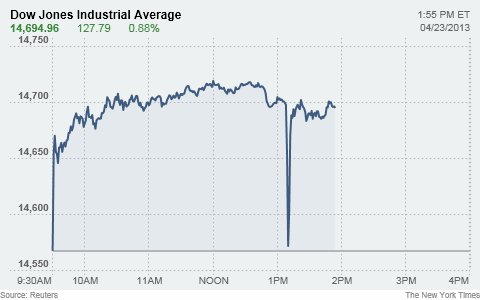
CATHERINE RAMPELL
Dollars to doughnuts.
4:14 p.m. | Updated One more proposal I liked, from Boston University’s Austin Frakt: “hash crash.”
The Associated Press’s Twitter feed was hacked today, and the hacker tweeted a message saying the White House had been attacked. Rest assured, there was no attack, but traders freaked out long enough about the hoax to make the Dow do this:

So will this sharp plunge (and quick reversal) get a nifty nickname like the “flash crash” did? I nominated “Tweet Retreat” on Twitter, and got some of these other suggestions in response:
What names do you suggest?
Article source: http://economix.blogs.nytimes.com/2013/04/23/naming-the-new-twitter-induced-flash-crash/?partner=rss&emc=rss